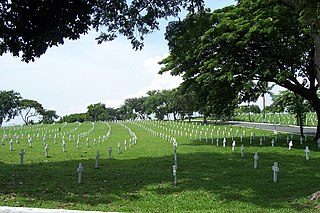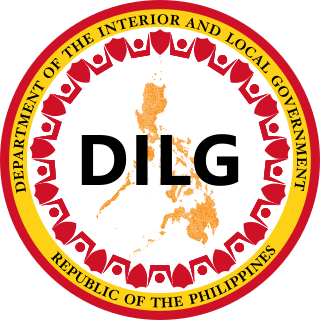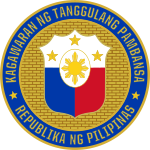
The Armed Forces of the Philippines (AFP) are the military forces of the Philippines. It consists of three main service branches; the Army, the Air Force, and the Navy. The President of the Philippines is the Commander-in-Chief of the AFP and forms military policy with the Department of National Defense, an executive department acting as the principal organ by which military policy is carried out, while the Chief of Staff of the Armed Forces of the Philippines serves as the overall commander and the highest-ranking officer in the AFP.

Fabian Crisologo Ver was a Filipino military officer who served as the Commanding Officer of the Armed Forces of the Philippines under President Ferdinand Marcos.

Libingan ng mga Bayani is a national cemetery within Fort Andres Bonifacio in Taguig City, Philippines.

The National Intelligence Coordinating Agency (NICA) is the primary intelligence gathering and analysis arm of the Government of the Philippines in charge of carrying out overt, covert, and clandestine intelligence activities. The NICA directs, coordinates, and integrates all intelligence activities, both foreign and domestic, concerning national security, serving as the leading intelligence collector of the national government, focusing on the country's strategic intelligence requirements. It is mandated to prepare intelligence estimate on local and foreign situation for the formulation of national security policies by the President and the National Security Council.

The Department of Budget and Management is an executive body under the Office of the President of the Philippines. It is responsible for the sound and efficient use of government resources for national development and also as an instrument for the meeting of national socio-economic and political development goals.

The Department of Foreign Affairs is the executive department of the Philippine government tasked to contribute to the enhancement of national security, protection of the territorial integrity and national sovereignty, to participate in the national endeavor of sustaining development and enhancing the Philippines' competitive edge, to protect the rights and promote the welfare of Filipinos overseas and to mobilize them as partners in national development, to project a positive image of the Philippines, and to increase international understanding of Philippine culture for mutually-beneficial relations with other countries.

The Department of the Interior and Local Government, abbreviated as DILG, is the executive department of the Philippine government responsible for promoting peace and order, ensuring public safety and strengthening local government capability aimed towards the effective delivery of basic services to the citizenry.

The Department of Tourism is the executive department of the Philippine government responsible for the regulation of the Philippine tourism industry and the promotion of the Philippines as a tourist destination.

The Department of Finance is the executive department of the Philippine government responsible for the formulation, institutionalization and administration of fiscal policies, management of the financial resources of the government, supervision of the revenue operations of all local government units, the review, approval and management of all public sector debt, and the rationalization, privatization and public accountability of corporations and assets owned, controlled or acquired by the government.

The Department of Agrarian Reform is an executive department of the Philippine government responsible for the redistribution of agrarian land in the Philippines.
Brig. Gen. Marcos Gulapa Soliman was a Philippine military officer who served as superintendent of the Philippine Military Academy, Commanding General of the Philippine Army, and upon leaving military service, chief of the National Intelligence Coordinating Agency. He is best remembered in history as the then-anonymous whistleblower who exposed the plans of then-Philippine President Ferdinand Marcos to place the Republic of the Philippines under Martial Law.

The Chief of Staff of the Armed Forces of the Philippines (CSAFP) is the highest-ranking military officer and the head of the Armed Forces of the Philippines (AFP), including all service branches under its command. The position is usually held by a four-star rank of General or Admiral. Its direct equivalent in the US Armed Forces is the Chairman of the Joint Chiefs of Staff. Unlike its US counterpart, which is merely supervisory, the Chief of Staff has complete operational control within the military hierarchy and is responsible for the overall operations of the AFP.

Fortunato Ubongen Abat was a Filipino major general who served as the 20th Secretary of the Department of National Defense (DND), Ambassador to the People's Republic of China, and Commanding General of the Philippine Army.

Lieutenant General Ernesto G. Carolina served in various civilian positions in government. He was Presidential Assistant and Chairman of the Joint Defense Assessment Planning and Implementation Group (JDA-PAIG), Office of the President; Undersecretary for Philippine Defense Reform Program, Department of National Defense (DND); Undersecretary for Civil, Veterans and Reserve Affairs, DND; and Administrator, Philippine Veterans Affairs Office, He held the rank of Undersecretary of the Department of National Defense for nineteen (19) years up to June 30, 2022. .
The order of precedence in the Philippines is the protocol used in ranking government officials and other personages in the Philippines. Purely ceremonial in nature, it has no legal standing, and does not reflect the presidential line of succession nor the equal status of the three branches of government established in the 1987 Constitution.
Manuel Tirso Tecson Yan, Sr. was a Cabinet Secretary of the Aquino, Ramos and Estrada administrations, World War II veteran and Chief of Staff of the Armed Forces of the Philippines from 1968 until 1972. He was said to be the last replaced official and obstacle to Ferdinand Marcos, and whose resignation made it possible for the ex-President to declare martial law in 1972. He holds the singular Philippine Government Record of continuous longest serving public Officer from April 1937 to January 2001 or a total 63 years and 9 months spanning twelve Philippine Presidents.

Delfin Negrillo Lorenzana, OLH, KGOR is a retired Philippine Army general who currently serves as the Chairman of the Bases Conversion and Development Authority since 2022. He previously served as Secretary of National Defense in the Cabinet of President Rodrigo Duterte from 2016 to 2022. He served in the Philippine Army from 1973 to 2004.

Carlito Guancing Galvez Jr. is a retired Philippine Army general serving as the Senior Undersecretary and briefly as officer-in-charge of the Department of National Defense since 2023 and Presidential Adviser on the Peace Process since 2018. He also served as the Chief Implementer of the Philippines' Declared National Policy Against COVID-19. In November 2020, he was appointed as the country's COVID-19 vaccine czar, and was responsible for leading the government's efforts in bringing into the country about 245.23 million doses of COVID-19 vaccines as of May 2022 beginning in 2021 despite the global vaccine shortage. Prior to this, he also previously served as the 50th Chief of Staff of the Armed Forces of the Philippines from April to December 2018.

The Inter-Agency Task Force for the Management of Emerging Infectious Diseases (IATF-EID) is a task force organized by the executive of the government of the Philippines to respond to affairs concerning emerging infectious diseases in the country.
The process of security sector governance and reform in the Philippines – which involves professionalizing, civilianizing, and modernizing/capacitating the Philippine government's security institutions to align them with ideals of good governance and with principles such as human rights, freedom of information, and the rule of civilian law – has been a continuing process since the establishment of the Fifth Philippine Republic after the 1986 People Power Revolution, before the concept had even been fully defined internationally in the 1990s.
















